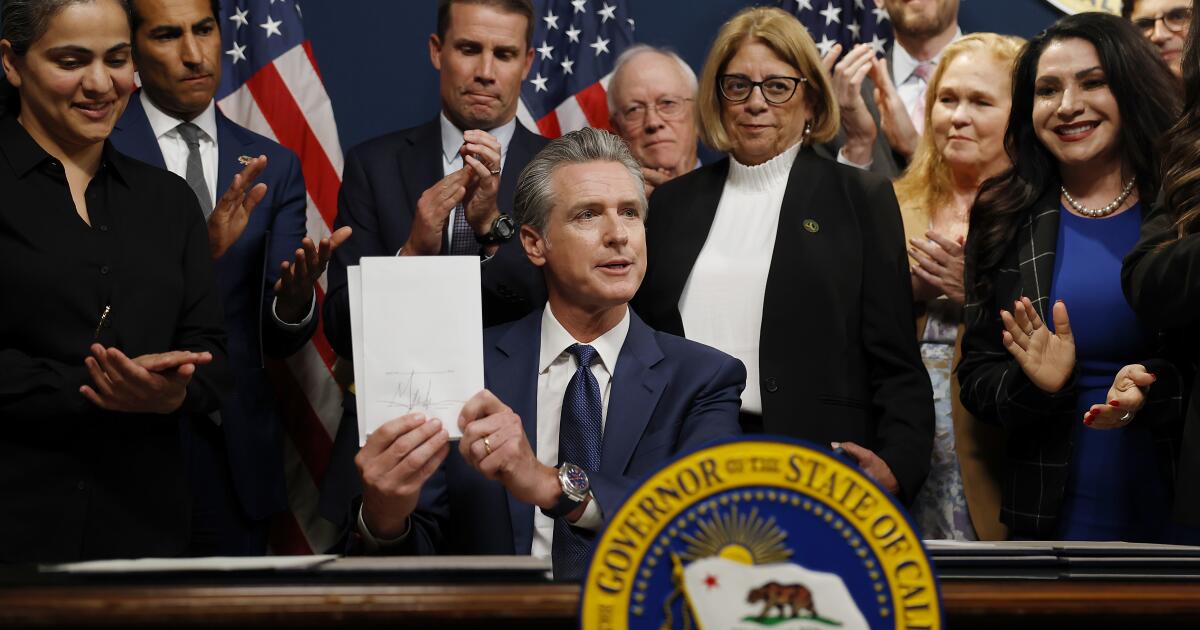Republicans try again to block Newsom’s plan that would tilt the scales for Democrats
SACRAMENTO — California Republicans again asked the state Supreme Court on Monday to block Gov. Gavin Newsom’s redistricting plan from the November ballot, arguing that the hastily assembled initiative violates the state Constitution.
In a 432-page lawsuit, Republican lawmakers said the effort by Democrats to unwind the state’s nonpartisan congressional districts is a violation of Californians’ rights to fair and nonpartisan electoral maps. The party made a similar argument last week in an emergency petition to the state Supreme Court that was denied without a hearing.
The ballot measure was crafted by Democrats as a retaliatory strike against the GOP-led Texas Legislature, which has passed new congressional districts that would help Republicans pick up five seats in the 2026 midterm elections.
The California plan, which is headed to voters Nov. 4 under the name Proposition 50, would throw out the state’s nonpartisan maps in favor of boundaries that would tilt the scales for Democrats.
The lawsuit filed Monday against California Secretary of State Shirley N. Weber and the state Legislature argues that the ballot measure is actually asking voters to answer two questions: first, whether Congress should amend the U.S. Constitution to require independent redistricting nationwide; and second, whether to scrap the nonpartisan districts in the 2026, 2028 and 2030 elections in favor of partisan lines that help Democrats.
That double-barreled question is an “illegal, take-it-or-leave-it choice,” said Michael Columbo, an attorney for the plaintiffs, that “forces a person in favor of independent commissions into a conundrum” and violates the state constitution, which limits ballot measures to a single issue.
That argument is “weak,” said David A. Carrillo, the executive director of Berkeley Law’s California Constitution Center.
“The common subject here obviously is redistricting,” Carrillo said.
President Trump said Monday that the Justice Department will sue California over the plan “pretty soon, and I think we’re going to be very successful in it.” He didn’t explain what legal standing the administration would have to challenge the state Legislature.
In a post on the social media site X, Newsom said of the Trump threat: “BRING IT.”
A spokesperson for Weber said the department had no comment on the lawsuit.
“Trump’s toadies already got destroyed once in court,” said Hannah Milgrom, a spokesperson for the Yes on 50 campaign, in a statement. “Now they are trying again, to protect Trump’s power grab and prevent voters from having their say on Prop 50. They will lose.”
The lawsuit also argues that the state Legislature violated the state Constitution by proposing new congressional districts, despite the fact that voters in 2010 passed a measure giving that power to an independent panel.
Republicans argue that in order to comply with the state’s current redistricting laws, Democrats should have first asked voters to suspend independent redistricting, then passed new maps afterward.
At the heart of the legal fight, Carrillo said, is voters’ tremendous power to amend the California Constitution, including who drafts the state’s congressional districts.
“Voters gave this power to the commission they created,” Carrillo said. “The voters can therefore modify or withdraw the power they conferred.”
The California Supreme Court has occasionally removed voter initiatives from the ballot, Carrillo said, but it’s rare, controversial and reserved for the most extreme cases. It’s “very unlikely the court would reach for the nuclear option,” he said.
Also Monday, opponents of the ballot measure filed a public records act request with state Atty. Gen. Rob Bonta, seeking communications between his office, Newsom and prominent Democratic strategists about how Prop. 50 will appear on the ballot.
The group, formed by former House Speaker Kevin McCarthy of Bakersfield and run by former California GOP chair Jessica Millan Patterson, said Democrats had called for transparency and ought to provide it too.
“Voters deserve to know if these top Democrats are actively trying to put their thumb on the scale for how their partisan power grab will be portrayed in what should be an impartial analysis,” Patterson said.
Times staff writer Seema Mehta contributed to this report.

